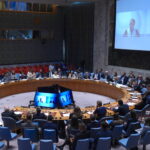Ireland’s foreign minister urged the U.S. to push for the end of Gaza war at the embassy Fourth of July party; Dublin moved to ban products from Israelis in the West Bank

Dan Kitwood/Getty Images
Taoiseach Simon Harris speaks to the media after the first Wicklow count the day after the election on November 30, 2024 in Greystones, Ireland.
Irish Foreign Minister Simon Harris urged the U.S. to end the war in Gaza at the American Embassy in Dublin’s Fourth of July party, days after the chairman of the Senate Foreign Relations Committee, Sen. Jim Risch (R-ID), warned that the U.S. may reconsider its economic ties with “antisemitic” Ireland.
Harris, who is also Ireland’s deputy prime minister and defense minister, began his speech by focusing on the close relationship between the U.S. and Ireland, according to Dublin-based The Journal, before pivoting to the war in Gaza.
Harris said at the event on Thursday that his country “want[s] the bombs to stop, the killing to stop … because the cry of a child is the same in any language. It compels us to provide comfort and protection from harm.”
“As human beings in positions of power, we can no longer bear the heartbreaking cries of the children of the Middle East,” Harris added. “And I join, I know, with everyone here in urging everybody involved to support and engage in efforts underway to reach agreement on a new ceasefire and hostage release agreement, to redouble those efforts and to end the violence once and for all.”
U.S. Ambassador to Ireland Ed Walsh did not applaud the remarks, The Journal reported.
Harris has previously called Israel’s war against Hamas terrorists in Gaza a “genocide.”
Earlier last week, Risch posted on X that “Ireland, while often a valuable U.S. partner, is on a hateful, antisemitic path that will only lead to self-inflicted economic suffering.” The post came after Harris introduced legislation to ban trade with Israelis operating in the West Bank and parts of Jerusalem.
Harris said that Ireland was “the first country in Europe to bring forward legislation to ban trade with the Occupied Palestinian Territories. Ireland is speaking up and speaking out against the genocidal activity in Gaza. Every country must pull every lever at its disposal.”
Risch warned on X that “if this legislation is implemented, America will have to seriously reconsider its deep and ongoing economic ties. We will always stand up to blatant antisemitism.”
The legislation is also known as the PIGS bill, an acronym for “Prohibition of Importation of Goods,” but is also an animal frequently used in antisemitic attacks and references.
A day later, Irish Prime Minister Micheál Martin said that Dublin must take into consideration the anti-boycott laws and executive orders in most U.S. states.
“We don’t want any companies or multinationals in Ireland inadvertently being caught up in this,” Martin reportedly said. “The object of the exercise here is to put pressure on Israel, not to disadvantage Ireland duly, and that’s a factor.”
Martin argued that his country is “just [targeting] in the Occupied Territories, not Israel as a country,” despite Ireland’s intense criticism and emphasis on Israel since the Oct. 7, 2023, Hamas terror attack.
In discussions of the bill in the Irish parliament’s Foreign Affairs Committee, the Foreign Ministry reported that trade in goods between Israeli settlements and Ireland in 2024 amounted to 214,000 Euros ($252,000), and that there had been zero trade in services between the countries in 2023. One lawmaker said that even “if the value was only €10, the symbolic value of the legislation is still enormous.”
Earlier this year, Ireland swore in a more moderate governing coalition than the country has had in previous years, and The Irish Mail on Sunday reported that the “Israeli trade ban will be dropped to appease [President Donald] Trump … The bill is now unlikely to ever make the statute books amid deepening fears it will damage Ireland’s corporate and diplomatic relations with the U.S.”
Versions of the bill have been on Ireland’s political agenda at least since 2018, but never passed, in part because of concerns that its implementation would violate European Union trade regulations. Israel has a free-trade agreement with the EU, which Ireland has called to reconsider.
The American Jewish Committee has called Ireland “one of the most problematic countries in Europe” when it comes to antisemitism and demonization of Israel, and said the situation for Jews in the country has significantly worsened since the Oct. 7 attacks, “posing serious risks.”
The AJC also found an increase in physical harassment of Jews, bullying and hostility on campuses and in workplaces in Ireland. The organization IMPACT-se, which analyzes textbooks, found last year that Irish school textbooks minimize the Holocaust and include antisemitic stereotypes and one-sided depictions of the Israeli-Palestinian conflict.






























































